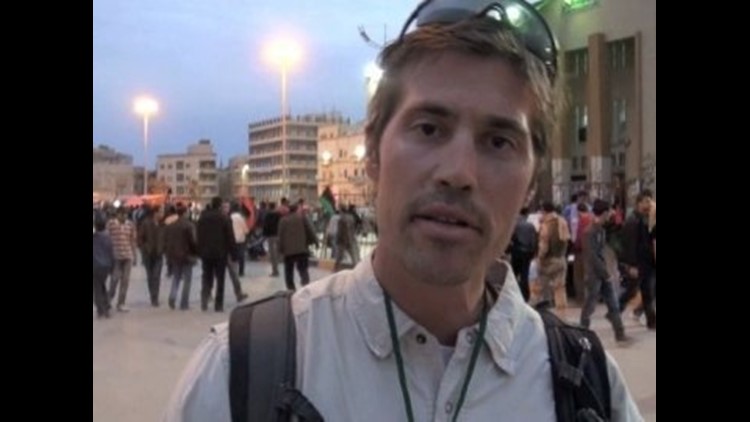(CNN) — The captors of American journalist James Foley originally demanded a ransom of 100 million euros ($132.5 million) for his release, according to GlobalPost spokesman Richard Byrne.
Foley was a freelancer for GlobalPost.
Earlier, Philip Balboni, the president and chief executive of GlobalPost, told the Wall Street Journal that the captors also demanded that money from Foley’s family.
Balboni declined to discuss GlobalPost’s reply to the demand, saying all communication was shared with appropriate government authorities, The Journal reported Thursday.
The Islamic extremist group ISIS, which controls large areas of Syria and Iraq, published a video Tuesday showing the journalist’s beheading. Foley, 40, was a native of New Hampshire.
A militant who appears in the video links the killing to the U.S. intervention in Iraq against ISIS, which refers to itself as the Islamic State. The killer says the fate of another American journalist shown in the footage, believed to be Steven Sotloff, depends on what U.S. President Barack Obama does next.
But the threat has done little to curb U.S. military operations in Iraq. Thursday, American warplanes continued airstrikes against ISIS targets near Mosul Dam, which had been in control of ISIS but was recently reclaimed by Kurdish forces. The United States launched six more airstrikes near the dam in support of Iraqi Security Force operations, according to Centcom. The strikes destroyed or damaged three ISIS Humvees, one ISIS vehicle and multiple locations where improvised explosives had been placed, the U.S. military said.
Calling ISIS a “cancer,” Obama said Wednesday that the United States “will continue to confront this hateful terrorism and replace it with a sense of hope and civility.”
U.S. Attorney General Eric Holder spoke Thursday about Foley, saying “We have long memories and our reach is very wide.”
“We will not forget what happened, and people will be held accountable, one way or another,” Holder said in Washington.
U.S. officials revealed that they had tried to rescue Foley and other captives earlier this summer in a special military operation in Syria. But the special forces from units such as Delta Force and Navy SEAL Team 6 failed to find the hostages.
“Unfortunately, the mission was not successful because the hostages were not present at the targeted location,” Pentagon spokesman Rear Adm. John Kirby said Wednesday.
Several ISIS operatives were killed in the special operation, a U.S. official said.
No U.S. personnel were killed, but one was slightly wounded. Fighters jets and surveillance aircraft provided overhead protection to the troops.
‘Vitriolic and filled with rage’
Messages from Foley’s captors began last fall, Balboni said Wednesday.
Foley was on assignment when he disappeared on November 22, 2012, in northwest Syria, near the border with Turkey.
“The captors never messaged a lot. There was a very limited number with a very specific purpose. … They made demands,” Balboni said.
Some messages were political and some were financial.
Then last week, his family received an e-mail saying he would be killed.
“The message was vitriolic and filled with rage against the United States. It was deadly serious,” Balboni said.
“Obviously, we hoped and prayed that would not be the case. … Sadly, they showed no mercy.”
Foley’s family, according to Balboni, responded in an e-mail, pleading for mercy and asking for more time.
They did not hear back.
Foley’s father’s broke down several times as he spoke Wednesday about his son.
“We beg compassion and mercy” for the other American journalist shown in the video, John Foley said. Sotloff, a contributor to Time and Foreign Policy magazines, was kidnapped at the Syria-Turkey border in 2013.
“They never hurt anybody,” John Foley said. “They were trying to help. There is no reason for their slaughter.”
Condemnation from the region
On Thursday, at least three countries in the region condemned Foley’s murder.
A statement on the Facebook page of the Egyptian Foreign Ministry called for a “concerted and combined effort” from the international community to fight against “terrorism as a global phenomenon” that threatens the stability of the world.
Bahrain said the beheading was a “terrorist act” that violated “the principles of the Islamic relation, human value and international law and norms,” according to a statement from its information ministry.
Qatar’s Ministry of Foreign Affairs called the killing a “heinous crime that goes against all Islamic and humanitarian principles, as well as international laws and conventions.”
The ministry said Foley “showed courage in conveying the truth from the most dangerous spots in the world, including the suffering of Syrians.”
The Deputy Secretary General at the Arab League, Ahmad bin Hilli, condemned the murder, also saying it was contrary to Islamic teachings and calling it “inhuman.”
A statement from the office of Tunisia’s president called crimes ISIS has committed “heinous” and a “serious threat to multiculturalism.”
“These terrorist organizations pose a threat to all countries in the region,” it read.
CNN’s Allison Brennan and Hamdi Alkhshali contributed to this report.



